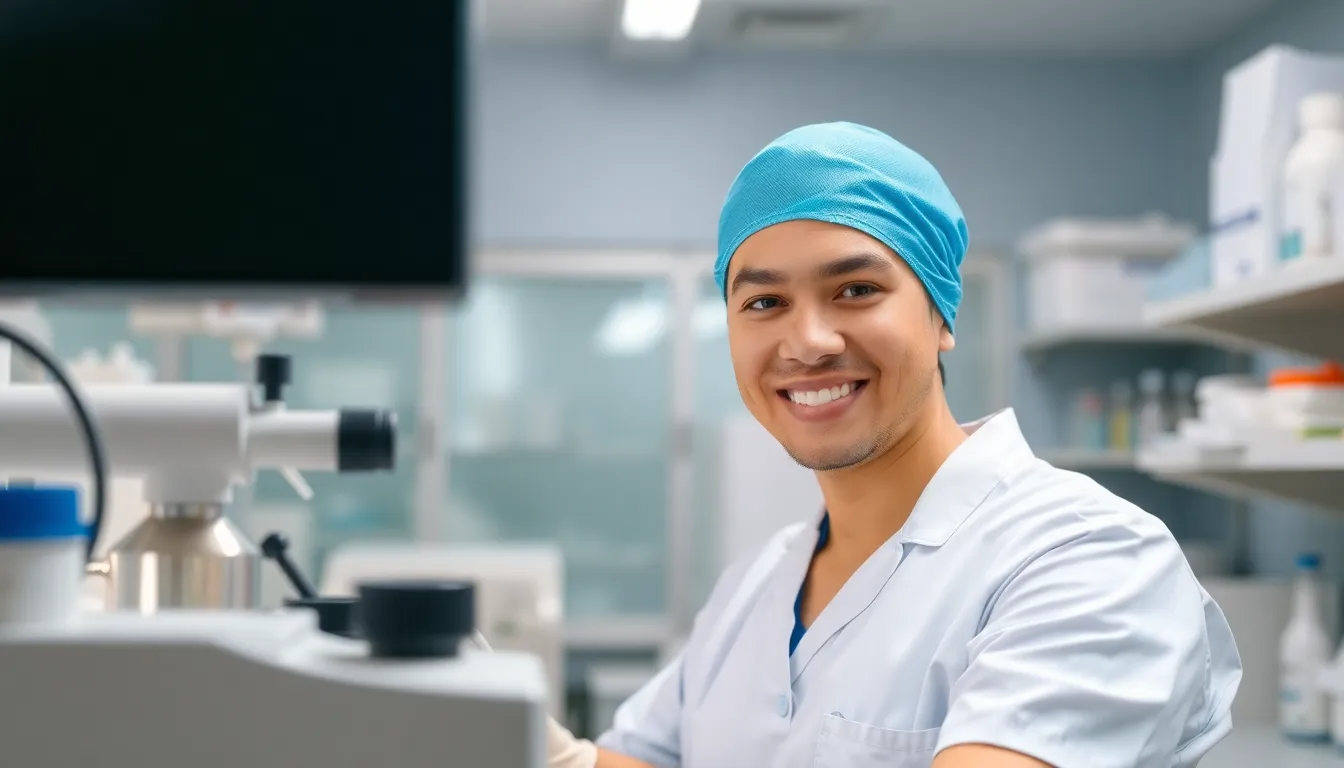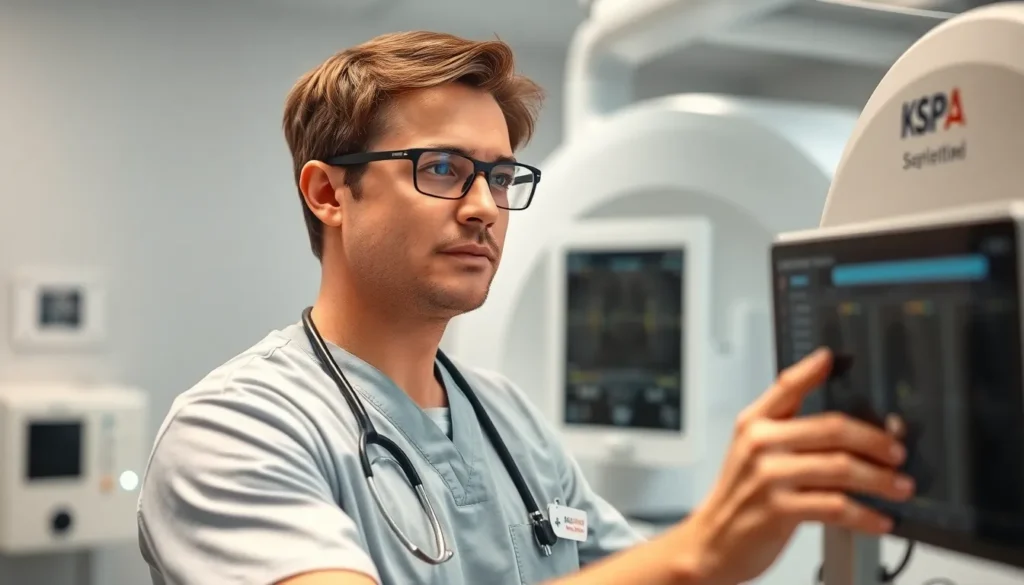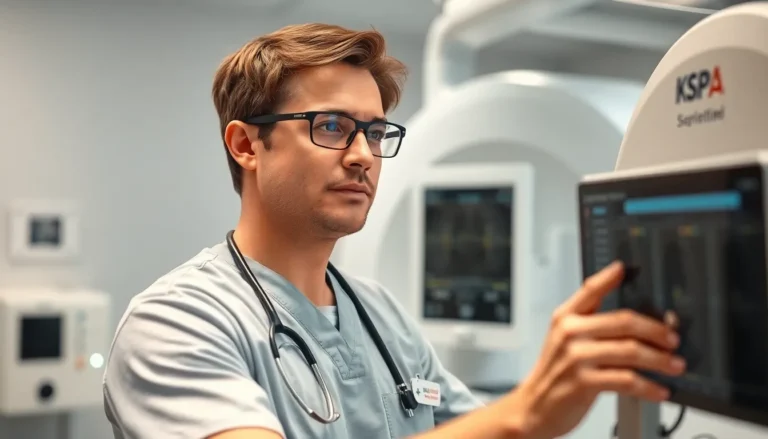In the fast-paced world of healthcare, certified med techs are the unsung heroes, armed with gadgets that could make James Bond jealous. These skilled professionals don’t just push buttons; they ensure life-saving equipment runs smoothly, making them the backbone of any medical facility. Think of them as the tech-savvy superheroes, swooping in to save the day when machines go haywire.
Table of Contents
ToggleWhat Is a Certified Med Tech?
Certified medical technicians (med techs) play a vital role in the healthcare industry, ensuring the functionality of essential medical equipment. Their expertise allows healthcare providers to deliver effective patient care.
Definition and Overview
A certified med tech is a healthcare professional authorized to operate, maintain, and troubleshoot medical equipment. Certification often requires completion of a specialized program and passing a recognized exam. These technicians possess in-depth knowledge of various medical devices, such as diagnostic imaging machines and laboratory analyzers. Skills acquired during training include understanding equipment safety protocols and recognizing potential malfunctions. Certification assures employers and patients that med techs meet high standards of practice.
Responsibilities and Roles
Responsibilities of med techs include routine maintenance of equipment to ensure reliability. They conduct regular inspections and calibrations to keep devices in optimal working condition. Providing technical support during medical procedures is also a critical role. Troubleshooting issues quickly and efficiently impacts patient outcomes significantly. Collaboration with healthcare teams enhances overall treatment and diagnostics. Med techs maintain accurate records of equipment status and service history, ensuring adherence to industry regulations and improving patient safety.
Education and Certification

Certified medical technicians (med techs) must complete specific educational requirements and undergo a certification process to ensure they can perform their roles effectively.
Required Education
Education typically begins with an associate’s degree in medical technology or a related field. Programs usually cover essential subjects such as biology, chemistry, anatomy, and medical equipment handling. Many institutions also include hands-on training to reinforce theoretical knowledge. Completing a bachelor’s degree may enhance career prospects, providing deeper insights into advanced medical technologies. Students can find accredited programs through organizations such as the American Medical Technologists or the National Accrediting Agency for Clinical Laboratory Sciences.
Certification Process
After finishing the educational requirements, candidates must pass a recognized certification exam. Organizations like the American Medical Technologists and the Board of Certification offer these assessments. Preparation options include study guides and practice tests to strengthen knowledge and test-taking skills. Certification typically requires renewal every few years, emphasizing the need for ongoing education and skills development. Compliance with continuing education standards ensures med techs remain current with advancements in medical technology and industry practices.
Skills and Qualifications
Certified medical technicians must possess a blend of technical skills and educational qualifications to excel in their roles.
Essential Skills for Success
Technical proficiency stands as a fundamental skill for certified med techs. Understanding medical equipment’s operation and maintenance is crucial. Problem-solving abilities enable them to diagnose and troubleshoot equipment issues efficiently. Attention to detail contributes to accurate inspections and calibrations, ensuring patient safety. Communication skills are also key, as they often work alongside healthcare teams to facilitate effective treatment procedures. Lastly, adaptability plays a vital role when navigating rapid changes in technology and workplace dynamics.
Recommended Qualifications
A minimum of an associate’s degree in medical technology or a related discipline forms the educational foundation for certified med techs. Coursework typically includes biology, chemistry, and anatomy, providing essential scientific knowledge. Hands-on training experiences reinforce theoretical learning, enhancing practical skills. Many candidates choose to pursue a bachelor’s degree to broaden career opportunities and advanced training. After completing educational requirements, passing a recognized certification exam is necessary to obtain certification from organizations like the American Medical Technologists. Ongoing education and skills renewal must occur regularly to maintain certification and stay current with industry developments.
Career Opportunities
Certified medical technicians encounter numerous career opportunities in the healthcare field. Their skills are highly sought after due to the increasing reliance on advanced medical technology.
Job Outlook and Demand
The job outlook for certified med techs remains strong. According to the Bureau of Labor Statistics, employment in this field is projected to grow by 7% from 2021 to 2031, driven by technological advancements and an aging population. Increasing demand for diagnostic services enhances the need for skilled med techs. Hospitals, clinics, and outpatient facilities actively seek these professionals, ensuring scalable job availability. Job openings arise from retirements and workplace transitions, providing ample opportunities for new professionals entering the field.
Potential Work Environments
Certified med techs work in a variety of environments. Hospitals stand as the primary workplace, where they support surgical teams and maintain equipment. Laboratories utilize med techs for testing and analysis, ensuring accurate results for clinicians. Diagnostic imaging centers offer opportunities to operate advanced imaging equipment. Med techs also find positions in research institutions and educational facilities, contributing to technological advancements. Each environment values their expertise, making it essential for med techs to adapt their skills to various settings.
Certified medical technicians play an indispensable role in the healthcare landscape. Their expertise ensures that vital medical equipment operates smoothly and safely. As technology continues to evolve the demand for skilled med techs will only grow.
With a solid educational foundation and ongoing training certified med techs are well-equipped to meet the challenges of modern healthcare. Their ability to adapt to new technologies and collaborate effectively with healthcare teams enhances patient care and safety.
As the industry expands so do the opportunities for aspiring med techs. This career path not only promises job stability but also the chance to make a meaningful impact in people’s lives every day.




